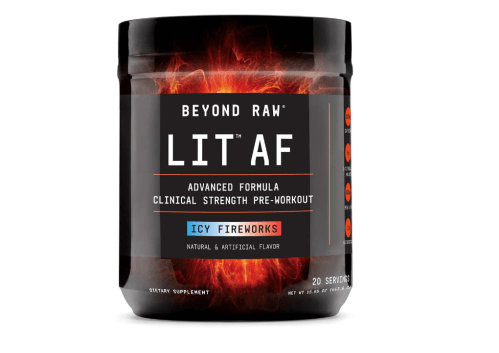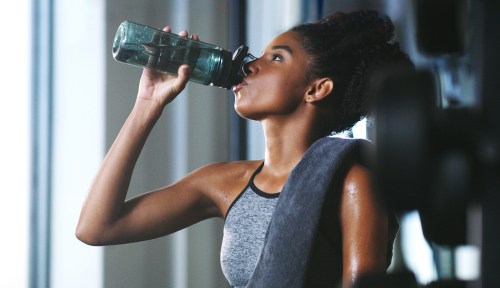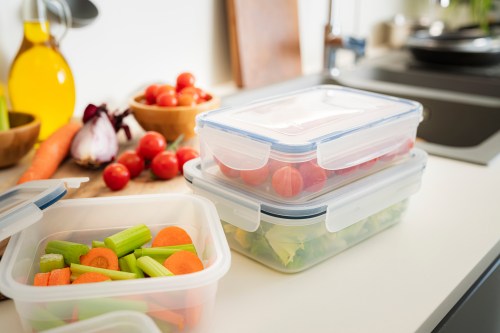Our editors independently select these products. Making a purchase through our links may earn Well+Good a commission
Truth: Sometimes boppin’ beats and a big, audacious fitness goal aren’t enough to get you hype for your workout. Some days you need a little extra something-something to hit the gym and hit it with intensity. Could a pre-workout supplement—like those littering your FitTok and Fitstagram feeds—be just that thing to infuse your training with a little fire?
Experts in This Article
Well, it depends on the pre-workout, as well as what else you’re consuming pre-workout.
What is pre-workout, exactly?
“There isn’t a textbook, universally agreed upon definition of ‘pre-workout’ because different brands create different versions of the product,” says dietitian and strength coach Albert Matheny, RD, CSCS, who is COO of ARENA Innovation Corp and co-founder of SoHo Strength Lab in New York City.
Broadly, ‘pre-workout’ is a term for a supplement category designed to be taken immediately before you exercise to give you a little extra oomph. “The idea is that they help you train harder and/or longer than you would be able to without them,” says certified sports nutritionist Allison Sizemore, an online fitness coach with Couture Coaching.
Typically sold as a powdered drink mix-in meant to be added to water, the pre-workout formulas on the market contain a variety of different ingredients. Some tubs might include things that have been shown to boost physical and/or mental performance while you work out, such as caffeine, creatine, beta-alanine, arginine, and/or nitric acid, says Sizemore, while others do not. Antioxidant blends, glucose (sugar), flavoring, and B-vitamins, electrolytes, and carbs are other common ingredients.
But you may not necessarily know how much of each you’re getting: One 2019 study published in Nutrients found that nearly half (44 percent) of the 100 pre-workout supplements studied were made up of proprietary blends, meaning that the ingredient dosages per serving were not included.
Pre-workout supplements don’t always increase energy
It’s common for pre-workout supplements to contain caffeine, according to Matheny, usually in the form of green tea extract, coffee beans, yerba mate, or caffeine anhydrous. Caffeine, after all, is one of the best, most-studied supplements on the market, shown to improve muscular endurance, muscular strength, and throwing performance, as well as a wide range of aerobic and anaerobic sport-specific actions.
However, there are caffeine-free pre-workout formulas, typically marketed as ‘non-stim’ pre-workouts. These versions won’t give the same jolt of energy as one that contains a caffeine derivative (duh). But depending on their specific ingredient lineup, a stimulant-free pre-workout can still improve mental focus and increase blood flow to the muscles.
Want to try a pre-workout before your next gym sess?

Beyond Raw® LIT AF™ Pre-Workout — $55.00
The energy you really need before a workout
Caffeine isn’t truly what powers your gym activities—calories are. Scientifically speaking, calories are energy units that the body uses like a car uses gasoline, explains Matheny.
Calories, of course, come from the carbohydrates, protein, and fats in food. Immediately ahead of a workout, you’ll want to stick primarily to simple carbohydrates, according to certified sports nutritionist Rachel Fine RD, CSSD, CDN, owner of To The Pointe Nutrition. “Consuming easily-digestible carbohydrates like toast, pretzels, or crackers 30 to 60 minutes before your workout will help to top off the glycogen stores,” she says. The body stores carbohydrates as glycogen in the muscles, she explains, so replenishing these ahead of exercise ensures you’ll have enough energy to last the duration of your workout.
If you’re strength training, you may also want to add in some protein to promote muscle recovery, adds Matheny. “Protein is slower digesting than carbohydrates” and therefore the body doesn’t usually use it as energy while you exercise, he explains. However, noshing on 20(ish) grams of protein—equivalent to three eggs or three ounces of chicken—before exercise has been shown to support muscle recovery.
So… are pre-workout supplements enough?
“Most pre-workout supplements are no- or low-calorie,” says Matheny. That might be useful for morning movers experimenting with fasted cardio. But everyone else will need to pair their pre-workout mix with some good ‘ole fashion real food. “You could, for example, eat a banana and eggs or oatmeal with protein powder before leaving for the gym, then have your pre-workout in the car,” Sizemore says.
If your workouts are still feeling a little ‘blah’ even after you’ve dialed in your nutrition, Matheny recommends drinking more water throughout the day. “Many people who are feeling flat in the middle of their workout routines are just dehydrated,” he says. As a starting point, Adrienne Dowd, a nutritionist with Parsley Health previously told Well+Good that she recommends consuming half your bodyweight in ounces of water each day for optimal hydration.
And don’t forget bedtime: You also want to make sure you’re sleeping enough, Matheny adds.
A pre-workout supplement can’t, on its own, get you through a workout if you’re not rested, fueled, or hydrated well enough. As Matheny puts it, “It’s always best to cover the basics before adding in supplements.”
Sign up for the Well+Good SHOP Newsletter
Get exclusive deals on wellness, beauty, fitness, and food products that have been hand-picked by our editors.
Got it, you've been added to our email list.









